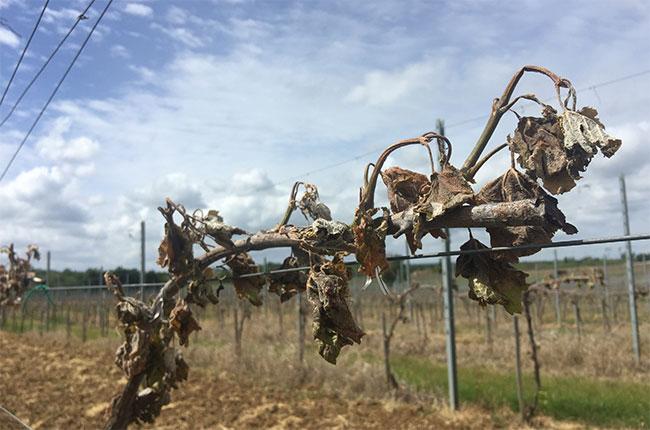France has formally requested assistance from the European Union to address a burgeoning crisis in its prestigious Bordeaux wine region. Facing economic challenges exacerbated by changing consumer preferences and climate impact, French authorities are urging Brussels to join their efforts in eliminating what they term “unprofitable” vineyards. This move underscores the delicate balance between tradition and economic viability in one of the world’s most renowned wine-producing areas. As the Bordeaux sector grapples with these pressing issues, the potential collaboration between France and the EU could reshape the future of the region’s wine industry and redefine its longstanding legacy.
France Appeals for EU Support in Eliminating Non-Viable Bordeaux Vineyards
In a bold move, French authorities are reaching out to the European Union for assistance in addressing the increasing number of unproductive vineyards in the Bordeaux region. This initiative aims to revitalize the local wine industry by eliminating vineyards that are no longer economically viable, allowing for a shift towards more profitable agricultural practices. Proponents argue that focusing on quality over quantity is crucial for the sustainability of Bordeaux’s esteemed wine reputation. To facilitate this transition, the French government has proposed a financial support package reminiscent of past EU interventions in struggling agricultural sectors.
Key stakeholders in the Bordeaux wine market have voiced their support for this initiative, recognizing the urgent need for reform. By reallocating resources and investing in more promising vineyard projects, vineyard owners and local governments believe they can enhance the overall quality of Bordeaux wines. The proposed action plan includes:
- Financial incentives for vineyard owners to transition away from unproductive land.
- Training programs aimed at modernizing winemaking techniques.
- Promotion of sustainable practices for a greener industry.
| Initiative | Description |
|---|---|
| Financial Package | Support for vineyard owners in transitioning to lucrative options. |
| Training Programs | Enhancement of wine production skills and modern techniques. |
| Sustainability Focus | Encouraging eco-friendly practices within the industry. |
Impact on the Bordeaux Wine Industry and Regional Economy
The Bordeaux wine industry, a cornerstone of France’s viticulture and mark of excellence, is facing a significant watershed moment as governmental discussions intensify regarding the destruction of unprofitable vines. This decision has far-reaching implications for the regional economy, primarily relying on wine production for employment and revenue. With the increasing competition from global wine markets and climatic challenges, the potential removal of vineyards may reshape not only local agricultural practices but also the cultural identity that the Bordeaux region has cultivated over centuries.
As the state looks to support the industry, the economic impact could manifest in various ways:
- Job Losses: Thousands of jobs tied to grape cultivation, harvest, and production are at risk, affecting local families and communities.
- Tourism Decline: The scenic vineyards are major attractions; reducing the number could deter tourists who come for wine tours and tastings.
- Investment Shifts: Stakeholders may rethink financial commitments to the area, leading to potential decreases in local investments.
This drastic approach by the French government underscores the urgency to adapt to the evolving market landscape. The regional economy may see a transformation as stakeholders ponder sustainable practices, potentially leading to a streamlined focus on quality over quantity. Balancing heritage with innovative approaches could either spell a renaissance for Bordeaux’s winemakers or signify the end of an era.
Sustainable Solutions for a Greener Future in Vineyards
As France grapples with the dilemma of unprofitable Bordeaux vines, a spotlight has been cast on the urgent need for innovative practices in viticulture that prioritize sustainability. The call for help from the EU emphasizes the potential benefits of transitioning to more sustainable methods that not only address economic hardships but also promote environmental stewardship. Adopting sustainable solutions can lead to enhanced biodiversity, healthier soils, and reduced carbon footprints, crucial for the long-term viability of the wine industry.
Key sustainable practices that vineyards can consider include:
- Organic Farming: Reducing chemical inputs can improve soil health and water quality.
- Agroforestry: Integrating trees with vine cultivation can enhance ecosystem services and biodiversity.
- Water Conservation: Implementing efficient irrigation systems to minimize water usage.
- Alternative Crops: Exploring the cultivation of lesser-known grape varieties or other crops can diversify production and mitigate economic risks.
To further illustrate the impact of these practices, below is a simple overview table showcasing benefits associated with sustainable vineyard management:
| Practice | Benefit |
|---|---|
| Organic Farming | Improved soil and water health |
| Agroforestry | Enhanced biodiversity |
| Water Conservation | Reduced resource consumption |
| Alternative Crops | Diverse revenue streams |
Potential EU Policies to Address Agricultural Challenges in France
France’s request for EU assistance in addressing the challenges facing Bordeaux vineyards highlights the urgent need for innovative agricultural policies. Policymakers are exploring several potential initiatives aimed at revitalizing the sector while ensuring sustainability and profitability. Key policies under consideration include:
- Financial Incentives: Providing subsidies or grants for vineyard owners to transition from unproductive grape varieties to more resilient alternatives.
- Training Programs: Implementing educational initiatives focused on sustainable farming techniques that equip farmers with knowledge on drought-resistant crops and advanced viticulture practices.
- Research and Development Support: Funding research projects that explore innovative grape cultivation methods, pest management, and climate adaptation strategies.
Furthermore, a collaborative approach involving local stakeholders is essential for the success of these initiatives. The EU could facilitate partnerships between vineyards, research institutions, and agricultural experts to foster a climate of innovation. A potential framework could include:
| Collaboration Model | Key Participants | Objectives |
|---|---|---|
| Public-Private Partnerships | Vineyard Owners, Private Corporations | Resource Sharing, Cost Reduction |
| Research Alliances | Universities, Agricultural Institutes | Innovation, Knowledge Exchange |
| Community Engagement | Local Farmers, Consumers | Market Development, Consumer Awareness |
Key Takeaways
In conclusion, France’s request for EU assistance in removing unprofitable Bordeaux vines marks a significant move in the ongoing evolution of the European wine industry. As the country grapples with challenges from climate change, market fluctuations, and shifting consumer preferences, this initiative reflects a broader trend of adaptation and sustainability within the sector. The potential collaboration with the EU could not only help rejuvenate the Bordeaux region but also serve as a precedent for other wine-producing nations facing similar dilemmas. As discussions proceed, stakeholders will be keenly watching how this strategy unfolds and what it ultimately means for the future of not just Bordeaux, but the entire European wine landscape.




